AJ Benza
Christine Grail
Introduction
dr george pollard
“AJ and I are at Ago,” says Neal Gumpel. “Ago is a Hollywood restaurant owned by Harvey Weinstein, the movie producer. He knows AJ, well, and invites us to his table.
“Quentin Tarantino is at the table, too. He has a huge script, sitting where his dinner plate goes. Tarantino wants Weinstein to make a movie, from this script.
“After listening to the back and forth about the lengthy script, AJ says to Harvey, ‘Why not make two movies?’ Whence came two volumes of ‘Kill Bill.’
Benza wrote two gossip columns, “Hot Copy” and “Downtown,” for the New York “Daily News.” The columns opened doors. “The phone rings at 4 am,” says Benza. “It’s Mickey Rourke asking me for a favour. Another time, Jack Nicholson yells, from the other side of a packed room, ‘Come over Sunday, I’m barbequing.’ I was 27. It was nirvana.”
“His New York fame,” says an A-list Hollywood actor who prefers we not use his name, “lead some people to believe AJ Benza is a rough, tough bad boy. It’s smoke and mirrors. Agencies lose money, today, because some agents, men, are honestly afraid of him.”
Neal Gumpel writes movies with Benza. “Let me give you a few examples of the rough and tough AJ Benza,” he says. “AJ finds dew-covered grass morbid and creepy; he won’t walk on it. He believes in ghosts and is afraid of antique furniture. He’s also the worst liar in the world.”
“AJ is all show business,” says Leroy Jones, a former literary agent. “Benza refined an image. The show business people who cause me to wonder are those who believe the image. Their job is to ply illusion and delusion, yet, they’re wary of an obvious put on. These people may have problems, not AJ.”
In Hollywood, hosting “Mysteries and Scandals” was the big break for Benza. “His no bull, New York attitude made ‘Mysteries and Scandals’ a success,” says John Rieber, head of programming at G4 media.
“AJ can walk into a room and befriend anyone,” says Rieber. “He talks honestly. This is a rare talent.”
Today, Benza hosts “High Stakes Poker,” with Gabe Kaplan, the comedian, actor and poker champion. “It’s the highest rated show on the Game Show Network,” says Kelly Goode, head of programming for the network. Benza, who claims to know nothing about poker, says, “High Stakes Poker” is “heroin for poker players.”
Andrew Lear co-manages Benza. “One night,” he says, “we’re at “Ago.” The restaurant teems with A-list celebrities. Who’s holding court, but AJ? Sitting next to him is Sharon Stone. Celebrities are leaning in to shake his hand. Bill Maher hovers. Everyone knows AJ and that his hard-shell is a work. He has the warmest heart in Hollywood, and the most talent.”
Read this rare, exclusive conversation, with AJ Benza. Learn about his life, talent, insight, intelligence and down-to-earth philosophy. AJ will change you, for the good.








Photographs (c) Olivia Bette Lapides.
GS What's the best advice anyone gave you?
AJ There’s no easy answer to your question. My father told me whoever makes the most memories, wins. His idea is always with me. It’s a great reason to do all you can, with your home and at work. These are where you make the important memories.
A high school Social Studies teacher, Lenwood W. Peacock, told me how fast life goes by – blip and it’s gone. He was an eccentric character from South Carolina and wore a three-piece suit every day. He promised his students “that once you learn American History from me, the name, Thomas Jefferson, will give you chills up and down your back.” It did, and still does.
Peacock had me list, in writing, twenty goals I wanted to achieve in my life. That's heavy for a 17-year-old, in the eleventh grade. I didn’t understand, but made the list. Today, about thirty years later, only two items on that list remain undone.
GS Seems Peacock forced direction and imagining on you.
AJ Yes, if you can see what you want to achieve, I think it comes easier or it seems so.
GS Is there’s more advice that stuck.
AJ My mother liked to say never climb a mountain leaning toward you or kiss a woman leaning away from you. Either way, she said, you’ll fall on your behind. She had my number, from day one.
GS Your parents influenced you, in the right way.
AJ I think that was the key. My father – Alfredo Cosimo Benza – sold carpet and linoleum for Kaufman Carpet, starting in the middle 1960s. He struggled, working hard all day, every day. He stuck to it.
My father rarely complained. He loved his kids, thoroughly, and all he did, he did for us. I follow his example.
GS Didn’t your father work for the government, at one point.
AJ Yes, in the 1950s and early 1960s, my father worked for the US Treasury; he was an undercover agent, if you can imagine. He busted Solly Gelb, one of the biggest drug dealers, in New York City. That was in the 1950s.
Everyone thought Gelb untouchable. He was part of the drug-dealing machine built by Arnold Rothstein, in the 1930s. My father caught Gelb, with heroin and opiates worth over two million dollars. It was the biggest drug bust in New York City history, to that time. My father was a hero and celebrity, of sorts.
GS The Gelb bust was before your time, but it must have made you proud.
AJ Late at night, under the covers, yes, with a flashlight, I read the yellowed clippings, about the bust. I got a charge out that, my father was undercover, like Frank Serpico, in the movies and on television.
Still, what I remember most is my father was away, a lot. He’d vanish for two or four nights, in a row. When he went into sales, he was also gone all day and well into evening.
I barely saw my father, and that’s the truth. He was a great dad, but he was rarely around. He was always working to support my sisters, Rosalie and Lorraine, and me. I work hard at my job, as did my father, but I work harder to make sure there’s time for my family.
My mother – Lily Maione Benza – worked odd jobs. She was a school lunch worker, for a time. She worked at a dry-cleaning store. Whatever she did, she did for the good of her children.
GS I heard your mother came from an interesting family.
AJ True, many of her family were Mafiosi. Her Uncle was Harry “Happy” Maione, a killer for hire. He worked for Meyer Lansky and Murder Inc. He never smiled, so everyone called him “Happy.” In 1948, New York State executed Happy for the gruesome murder of George Rudnick, a supposed government informant.
GS Law enforcement on one side and gangsters on the other makes for an interesting family, but back to your parents.
AJ It was most difficult when they died. Work hard, die young is not my idea of the American dream. I was in my 20s, and their deaths made me want to succeed, right away, to live life to the fullest, starting immediately.
I didn't want to end like my dad, away much of the time, struggling to pay the bills. I wanted to do what I wanted to do; I don’t think selling carpet was what he wanted to do. Guess I wanted my life on my terms, not life at the whim of other people, as had my parents.
GS The early passing of your parents motivated you to achieve.
AJ Yes, the snag, of course, is they never saw any of my successes. They saw a typical kid, with typical jobs, not the “Daily News” columnist, the actor or the success of my book, “Fame.”
My parents taught my sisters and me that we could do whatever we wanted to do. I believe I can do whatever I want, and succeed. My parents motivated me to try, to get my behind moving, work hard to succeed. Be good, if they would’ve seen how well their advice worked.
My first marriage ended, about the time my parents passed away. I sensed the marriage was a roadblock. I had to let go of the marriage to fulfil my dreams, which were my highest priority, at the time. I wanted to honour my parents by fulfilling my dreams and succeeding. For a long-time, that idea, success as honouring my parents, fuelled my drive and ambition.
GS Your birth name, Alfred Joseph Benza, naturally leads to AJ. What’s the name story?
AJ Growing up, I was Alfie, to most people. I went to my 20th high school reunion, a few years ago, and everyone called me Alfie. It was strange hearing Alfie, after all the years, of AJ. It was a bit confusing, but heart-warming and a wonderful time.
In my early 20s, my friends began calling me Pope. They thought a Mickey Rourke character, in the movie, “Pope of Greenwich Village,” was similar to me. The Rourke character, Charlie, is cool,� an idealist willing to help everyone, even if it’s not in his own best interest.
Charlie, the pope of Greenwich Village, is a maitre d’, who’s trying to find money to open a restaurant. Reluctantly, he goes along, with his cousin, Paulie, portrayed by Eric Roberts. They steal $150,000 to buy a racehorse and win enough money to open a restaurant. It’s a New York story.
GS Once the Pope, of New York City, now you're the Pope of Hollywood and
Vine.
AJ I hope so, but AJ is easy for media work. There’s nothing to mumble in two letters. Nor is there much chance of mispronouncing AJ.
As I mention, in my book, “Fame,” Rourke helped my career in gossip journalism. On the prowl, in New York City, one night, with a friend, we run into Rourke. My friend knows Rourke, who invites us to tag along. I meet a few celebrities and my gossip news career gets a kick-start.
At school, I was Alfie. On the street, I was Pope. Working, I’m AJ.
GS In a sense, I guess, life came together for you, sadly, around the time your parents passed away. How did the urge to succeed, on your own terms, translate into Journalism School?
AJ As a kid, I read newspapers, all the time. My parents read the papers; I wanted to be like my parents. Reading leads to writing, so I wrote, for no particular reason, when I was a kid.
I didn't know what I wanted to do, with my life. I knew I wanted to be famous. It’s arrogant to say, but true.
I love movies. I love television. I read the newspapers to find out about movies, television and celebrities.
All my friends were testing for the police or fire departments. I knew I wanted to be on television or in the movies. I didn't know how I might realize my dreams.
Thanks to Mr. Peacock and his list, I knew I wanted to be a writer, talk show host, television or movie actor. I couldn't pin it down. I knew I wanted people to hear and see me. I knew I wanted people to remember me.
GS Any event, in particular, confirm your interest in writing.
AJ I wrote a short story, for an eleventh grade creative writing class. It was a corny story, about a kid playing stickball. He hits a home run for his grandfather, who is dying. The kid runs to the hospital to tell the grandfather, "I hit the home run for you Poppa," and abruptly the grandfather dies.
It was a childish, but tender story. When I finished reading, every young woman in the class was crying. I looked around the room. I said “Wow,” aloud, “I can make women cry.”
Make women cry, in a good way, of course, because they’re happy. At seventeen, I believed women cried when they thought something was cool. From that moment on, I wanted to do whatever women thought was cool.
My creative writing teacher, Mrs. Kamholtz, said, “You should write.” The class, well, the young women in the class, agreed I was a writer. Now, on Facebook, these same women, from my creative writing class, are connecting, with me. They remember the story, the day I read it, and that’s cool.
GS Writing was on the bucket list Mr. Peacock had you make, I guess.
AJ Yes, but I didn't know I could write. I didn’t know how to find a writing job. I didn’t know where to start.
I knew I’d get into acting, eventually. I knew auditions, cattle calls and so forth were a way into acting. I didn’t think, for a moment, that writing would open the door for me, but it did.
From that high school class onward, I was sure I wanted to write. It was a way to get attention from women. I always like to please women. My motto, I guess – is if women like it, do it.
Thirty years ago, I dreaded taking a class with Mrs. Kamholtz. She terrified me, and rightfully so. She also changed my life, in a good way.
GS Where did her creative writing class take you?
AJ I guess it gave me confidence and more motivation. I went to journalism school, at C. W. Post. A “Playboy” magazine poll put Post in the top ten schools, in the country. I figured the “Playboy” recommendation meant a campus full of good-looking young women. That’s why I went to C. W. Post.
I also found a part-time job at a newspaper. I held on for a long-time. Slowly, bylined news items and articles came my way. In fact, my first assignment was to write the obituary for my mother.
GS That seems terrible; was it?
AJ When she died, I asked to write her obituary. Normally, an editor won’t assign an obituary to anyone so close to the deceased. Lucky for me, the editor let me do it.
GS Eventually, you became the gossip columnist of the New York “Daily News,” writing “Hot Copy” and “Downtown.”
AJ I was writing sports for “Newsday.” That was mostly a clerical job, if a job in news. There were short bursts, of work, and much time to watch sports on the newsroom television.
Linda Stasi was writing a gossip column, for New York “Newsday.” I asked if I could help her out, I needed extra money, something to fill time, when not taking sports scores over the phone and to fulfill my urge to write. She agreed.
When Linda moved to the “Daily News,” I went along.
AJ, Michael Lewittes and I spent four years laughing our asses off, writing the “Hot Copy” column for the New York “Daily News.” AJ is so funny, so on the mark and such a good writer that he made coming to work more fun than it should have been. AJ is simply the best.
Linda Stasi,
Columnist and Critic,
New York "Post";
co-host, "What a Week" on NY1
GS From what you wrote, in “Fame,” gossip is a hectic news beat.
AJ The pace was brutal, but great fun. I couldn’t do it, again, at that pace, that speed, anyway. I was young. I had young legs.
I would get up and go to work for 9 am or so. I'd work until maybe 6 pm or 6:30 pm. I’d go home to walk the dogs. Then I'd go party the night away, all-night, every night. I’d have dinner at a restaurant at 8 o'clock. Then on to four or six clubs, until 2 am or 3 am. In bed by 4 am, but up at nine for work, day after day.
I worked that grind for almost six years. I felt like I was on air. I didn't feel I was struggling.
I went through two back surgeries, during this time. If something happened, it didn't matter. I kept going.
As the columns became more successful, I became more widely known. I was on a social high, all the time. For a young man, a twenty-something, there was no getting around that lifestyle.
GS That’s some life for a young man.
AJ Nothing, except my family, today, comes close to providing the high I had walking into the New York “Daily News” building, knowing I had to fill a page of gossip for New York City to read. The challenge was how to fill the page. That was such a competitive high. It’s the most fun I've ever had, on-the-job.
I felt great, walking around the newsroom, swigging coffee, waiting for New York to read my work. As exciting as movies or television can be, nothing tops the “Daily News.” Writing “Hot Copy” and “Downtown,” all the headaches that went into the columns, every day, those were nonetheless great days.
GS What's your take on how gossip news has changed over the last decade or so since you left, courtesy of Pete Hamill?
AJ I think most of it is horrible. Most of it is and has been, for so long, fixated on Brittney Spears, Lindsay Lohan, Nichole Ritchie and Paris Hilton. There’s far too much attention given those young women, for far too little value. Digging for a story, gossip or hard stories, is what news is about, not only stage-managed events, such as sightings at the gas bar.
An idea, that is, celebrity or paparazzi journalism, seduced everyone into a vortex, a whirlpool of emptiness. Simply asking a celebrity about their flight or children isn’t usually much of a story or decent journalism. It’s pure narcissism, not gossip news.
GS Any ideas about why the drastic change in gossip news.
AJ Someone assumes that all viewers or readers want to know is Lindsay Lohan and Samantha Ronson, when they were together, often had loud arguments, in public, at a Target store, for example. No reader goes to a Target store looking to see if Lohan and Ronson are in an argument. Chasing a celebrity, who’s pushing a baby carriage down a busy street, is an inexpensive way to fill television time or magazine pages.
Gossip, today, isn’t news. It’s not interesting. It is cheap filler, a diversion.
GS Seems producers and publishers don’t hold their viewers and readers in high regard, feeding them a diet of tripe.
AJ I like to think those weren’t the stories we wrote, Linda Stasi, Michael Lewittes and I. We tried, hard, to offer interesting stories. We hoped readers might learn as they enjoyed reading. We wrote nine or ten stories a day using that philosophy.
I did it for six years, six days a week. I wrote columns “Hot Copy” columns, Monday to Friday. For the Sunday edition, I wrote “Downtown,” which was my own column, in the New York “Daily News.”
I think all my columns were news; gossip, yes, but news, first. I tried to make my columns interesting, not merely lists of whom did what to or with whom. I dug for Michael Jackson material, in the 1990s. I wanted to write interesting, factual stories to hold reader interest, not rumours or slurs.
Rumours and slurs reflect on the newspaper. If you use too many rumours, most won’t pan out leaving large gobs of egg on your column. Readers quickly tire of slurs, too.
If a newspaper or television show constantly churns readers, that is, must attract new readers or viewers to replace those who stop reading or watching, rumours and slurs might work. Titillation has a short life span. Sooner than later, your audience tires of your approach.
The audience looks elsewhere, for entertaining news. You need a steady stream of new readers or viewers to take up the slack and finding a new audience, all the time, is hard. The truth is you’re spending more time finding the audience than digging for stories, with substance.
On the upside, I enjoy gossip. I stay in touch, with George Rush and Joanna Malloy, for example. They wrote “Page Six” at the New York “Post,” in the early 1990s. Once we were competitors, now we’re good friends. If I get a tip, I pass it on to them. The stories are fun, not nonsense.
GS Rush says the job gets harder every day.
AJ He’s been doing it fifteen or more years, uphill all the time. The business is different, today, than in 1995. Times change, Bono, Stallone and Willis pushed off the page, replaced by Lohan, Miley Cyrus and Audrina Patridge. George Rush is a good reporter. I feel bad he has to cover such nonsense.
Think about it. Lohan, Cyrus and Patridge appeal to fifteen year olds. How many fifteen year olds buy or read newspapers? They text, but don’t buy papers; they circulate old information, which is too often wrong. One of them quickly reads over a newspaper or magazine their parents bought; maybe someone checks an on-line source or two. Then she or he sends reports to a dozen friends, who pass the text along. One copy of “Post” or “Daily News” sold, and much misunderstanding created. Women and men who buy newspapers or magazines, regularly, want to read about Bono, Stallone and Willis.
GS What were some of your best stories and scoops, at the “Daily News”?
AJ We broke the Michael Jackson story, no question about it. We had direct line to the mother of the allegedly molested child. Everyday there were rumours going around, about Jackson, which we had to wade through to find the truth.
About the same time, OJ Simpson was on trial, for the murders of his ex-wife and Ronald Goldman. This was the top news story, everywhere. As a columnist, I spent time in Los Angeles, going to the trial. I came away, with a stronger sense, for being on-site, and my columns showed it.
Now, those stories are moth-eaten and dusty, but at the time each was explosive, such a big part of society. Lohan doing the nasty with Ronson withers in comparison. How can Brittany going to the gas bar compare?
During the Simpson trial, I’d sit in my office, a colour photograph of Nicole Simpson, murdered, on the wall. We didn’t run the photograph. Its presence, though, made my writing, my columns, visceral. No one can accuse gossip stories, today, of being visceral.
Simpson and Jackson were the big stories, the scoops, of my time, at the “Daily News,” and helped make me a success. The best part about OJ and Jackson is both stories continued for years. There were stories, inside stories, and more stories inside those stories. Both OJ and Jackson were faucets, with no off valve.
GS What was gossip news like when you arrived?
AJ When I started, there were still a few traditional columnists, such as Liz Smith, who just left the “Post,” and Cindy Adams, who’s still at the “Post.” These big guns had unassailable reputations and all the contacts. Few celebrities refused to take a call from Smith or Adams or offer a response, to an item, when asked.
Smith and Adams had an army of reliable people who’d call in sightings, items or tips. They had writers to help work up the columns. As Walter Winchell, before them, Smith and Adams ran gossip industries.
I was unique. I wasn’t British or gay. I was a New York street kid, who wanted to write about celebrities and was willing to work it hard.
I had an “in,” with celebrities, which came from my earliest days as a sports staffer at “Newsday.” I drank with celebrities. I partied with them. Celebrities let me in on news they’d talk about at home and I could use in columns, if I didn’t mention where I got it.
At 4 am, lips are loose. Sitting in a tight booth, at a Soho club, as the sun rises, with one or three celebrities, you hear what you shouldn’t. Once they trust you not to reveal sources, the celebrity faucet flows freely.
Celebrities like to dish dirt on their competitors. I can’t tell you how many major celebrities picked up a telephone to drop a dime on another celebrity. I printed much less than supplied to me, which added to my reliability.
GS You didn’t do all the reporting on your own. You had a good team.
AJ At first, I worked for Linda Stasi. She’s the best in the business. I was there to do her legwork. At that point, writing “Hot Copy,” we were the best in town. A couple of years later, Linda left and the column dumped in my lap.
When Linda left, Michael Lewittes was worth his weight in gold. Lewittes and I hired Jimmy Rutenberg to find celebrities and ask questions we thought embarrassing. He’d ask the toughest, most unusual questions you can imagine, and not blink. Now, Rutenberg is with the Washington Bureau, of the New York “Times.”
GS Linda Stasi mentioned an incident you handled, well. She had a visitor when she was away from the newsroom, I think.
AJ Yea, before 9/11, anyone could wander most anywhere around the “Daily News” offices. One day, a visitor wandered into our newsroom, asking for Linda. We told him she was out for the afternoon. He wouldn’t leave and sat in her rolling office chair, waiting.
I casually walked up behind her chair, talking all the while to him, and I started to ease the chair across the newsroom toward the elevators. The visitor, in the chair, looks up at me, “What the heck are you doing,” he says with his eyes. I press the down button and we wait for the elevator.
When the elevator arrives, I step into it and press the ground floor. Then I step back, behind the chair, and tip it forward. Our visitor stands up, naturally stepping into the elevator, and the doors close.
Next day, the “Post,” I think, reported I beat-up an older man in a wheelchair. I didn’t beat him up, of course, but he was in a “wheelchair.” The competition for gossip is absurd sometimes.
GS Is web gossip comparable to “Hot Copy” or “Downtown”?
AJ For now, web gossip is a bathroom wall. We, Linda, Michael and I, had bono fides, education and experience. An editor, who won a Pulitzer Prize, went over every word we wrote. Top dollar lawyers also reviewed every column.
Now, bloggers write whatever they want. There’s no policing or sense of responsibility. Not that long ago, to write gossip you needed a journalism degree and years of experience; now, you need a keyboard.
Anyone can start a blog. It costs nothing, simply go on-line and pick one of a thousand sites offering free blogs. You post whatever you want, on your blog. You can write AJ is dating a starlet. Someone believes the comment and passes it to others, spicing it up a bit. In no, time your children are wondering about their father. There’s no scrutiny or self-policing and it’s almost one hundred percent anonymous. Most everyone uses a pseudonym.
I read an on-line story, the other day, about Virgin media firing a dozen employees because of what managers read on blogs. Supposedly, the employees were critical, of management, customers or clients. Managers took exception, probably didn’t check any facts and fired these women and men. I suppose those who posted the comments might have denied doing so, but they were honest enough to admit to the blogging.
Blogging may be dangerous. On-line, anyone can write anything and put your name to it. There are no checks or interest in balance.
At the “Daily News” and the “Post,” gossip was news, not fluff and by-lined. Writers owned their stories. A tip began the search for facts.
Today, the tip is the story. A tip, now, is as likely an urge as a fact, given there are no standards, on the web. This turns me off, but there’s only so much space in a text message.
GS What mistakes did you make, while you were writing “Hot Copy” and “Downtown,” for the “Daily News”?
AJ There were times I'd go to bed, put my head in the pillow and wonder, “Should I have made that joke?” I made mistakes, as everyone does. Nothing risked, nothing gained, so, yes, I made mistakes.
GS How did celebrities react?
AJ Celebrities confronted me, all the time, and sometimes years after the fact. I wrote Ben Stiller, the actor, was having an affair, with Jeannie Tripplehorn, during a movie shoot. He approached me saying, “You're wrong. You’re making my life hell.”
I hated stories that enraged celebrities. I hated the moment Ben Stiller came up to me. I knew I was wrong, I should have held off on that story.
The decision to go with the Ben Stiller story was mine. I thought it was right to go with the story. It was a minuscule matter, I thought. I lived through the results and he lived with the results.
GS Has time softened your views?
AJ I'm older. I have a taste of celebrity. I know it would suck for my wife, Lola, to open the paper and read something untrue about me. It’d hurt more for my children, Roxy and Rocco, to hear such lies.
I still cringe about some stories I wrote; stories about private lives that barely qualified as gossip. I tried to stay clear of sex lives, but some items are weird funny and you can’t take a pass. Sometimes you do the story for the sake of a joke.
GS Any one these stories stick, with you.
AJ There’s one involving Robert Downey Jr. I was in Los Angeles, for the Oscars. Downey and I were touring, separately, the same after parties, such as the “Sky Bar.” Downey’s tossing back and beer. He’s wearing black nail polish.
I knew my days at the “Daily News” were numbers. Pete Hamill, the editor at the time, was going to fire me. There was no way around that fact.
Hamill was letting me cover the Oscars, as one last fling, I guess. When I got back to New York, he fired me, right away. He did.
I figure there’s a story or two left before I’m out the door. I write about Downey, wasted, out of control and file the story from Los Angeles. Then a flood of mail arrives saying I’m wrong. Downey’s filming in South Carolina or Georgia; hasn’t been to LA for weeks or months. Liz Smith, in the “Post,” writes Downey is going to sue the “Daily News” and me.
I held my ground. No one sued. I wondered about all the kerfuffle and then nothing.
A few years later, I moved to Los Angeles. My first manager had worked with Downey. He told me my story was true. Someone snuck Downey out of South Carolina to Los Angeles, and let him loose. When my story broke, they flew him back to the film location. Downey was on probation. He would’ve gone to jail, if he not returned to filming before a judge noticed.
My story was true. I drank beer standing alongside Downey, at a few hotels. Still, he might have gone to jail because of my story. It was a heavy stone to tote, but it was newsworthy.
GS What was the goal of “Hot Copy” and “Downtown”?
AJ What we tried to do, more than anything, was make people laugh, as they read a story. There’s nothing funny in gossip news, today. A bumpy cross-country flight or your child is colic aren’t usually sources of much humour.
At “Hot Copy,” we wanted to write gossip similar to an opening monologue by Letterman or Leno. We wanted to have fun as we broke news. Make readers laugh, provide a serious point or two, maybe, but leave them happy and wanting more.
I see this approach nowhere, today. Gossip news has changed, dramatically. Bigger is seldom better.
GS There’s an adage about “Chinese Food,” after two hours you’re hungry, again. You’re saying gossip, today, is “Chinese Food.” You, Stasi and Lewittes offered more meat and potatoes.
AJ In a sense, yes, that’s what we tried to do. An anonymous blogger writes what he or she wants. Truth or lie, it doesn’t matter and has an effect, as some readers believe the comment. If you see the movie, “Wag the Dog,” you’ll know exactly what I’m saying.
GS What stories do you think you missed, at “Hot Copy” or “Downtown”?
AJ Well, there were stories I knew, but couldn't write. I had a high-profile girlfriend at the time. She was a model and knew celebrities, such as Madonna. Her child played with the daughter of Madonna. I wouldn’t write about what I learned from that friendship.
We didn’t miss many stories. Overlooked stories grew more frequent, though. Looking back, I think, the more I became part of the world I covered, for the “Daily News,” the more stories I ignored, without realizing what I was doing.
GS Do you think your personal life compromised your news work?
AJ Yes and no, gossip news is readily available, if you look. Not every tidbit is usable. I decided to use some items or sources, but not others. In this sense, my personal life had little effect on my work.
Still, I got to a point where I had friends, such as Jack Nicholson and Mickey Rourke. My celebrity friends made comments or passed along information they and I knew I couldn't write. Such-and-such was a great story, but I didn't want to lose their trust or friendship. I wrote about other gossip and, maybe, passed along the story to another columnist. In this sense, my personal life likely got in the way of my work.
GS Did your dream, to work in movies or television, influence your news work?
AJ That would be true for anyone, in any job. Your dreams effect your decisions at work. I let some stories slip past because of my ambitions.
It’s common to give stories to the competition. I gave stories to Rush and Molloy. I’d say, “I can't put my name on this item. I can't write it, but it’s what's going on. Can you use it?” Washington reporters and columnists use this tactic, all the time. Gossip news is no different.
GS Some balancing act.
AJ It became so tricky. When the “Daily News” fired me, it was a relief, of sorts. I couldn't do what I did, well, for much longer. The “Daily News,” in a sense, forced my decision.
Linda Stasi and others taught me to put my faith in the story, to let people see what's inside the fishbowl. Everyone thinks she or he wants into the fishbowl, but seeing inside usually is enough. I was no different, but I also took news seriously.
Once I moved inside the fishbowl, life and work were different. I had a small part in the movie “Ransom.” One day I walked the red carpet, with my co-workers or competitors on the other side of the rope, yelling questions at me. The next day, I was on the sideline, asking for comments from those on the carpet.
GS What was it like, moving inside the fishbowl?
AJ My view skewed. I couldn't do the gossip I wanted to do, any more. If I did what I wanted, I’d lose contacts, a movie role, friendships or upset people, in Hollywood, who I needed in my job.
GS Do you think about how your life would be different, if you stayed in gossip.
AJ Sometimes, I realize if I kept doing gossip, I’d likely be out of work or hardly making a living, today. As I said earlier, I don’t care for gossip news, today. I wouldn’t keep my opinions inside. When I believe there’s a better way and no one honestly says different, I speak my mind. Right or wrong, I’d be out the door.
When I left the “Daily News,” I wasn’t sure I wanted to continue doing gossip. It was the growth area of news, in the late 1990s. Everyone asked me to do gossip. I worked the “Joan Rivers Show,” for a while, but turned down most offers.
GS I guess it was time for you to move on, to realize more of the goals you listed for your Social Studies teacher.
AJ Yes, I wanted to host television shows. I wanted to act. My manager, at the time, said, "Gossip is your ticket." I said, “Yes, but I want to change course. It’s time to move on.”
Today, I’d be unhappy only working gossip news. I had a great time, in gossip. I still have a great time hosting a few gossipy television shows. The transition was good, from gossip columnist to television host.
GS Are there any gossipy stories you wished you’d written about.
AJ Princess Dianna, for sure, but I was long gone by then. I wish I had been able to write about the death of John Kennedy, Jr. In the end, it is all right my gossip career ended when it did. I’m not sure I could do gossip news, today.
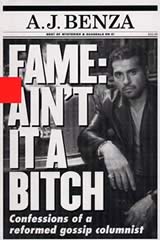


GS You wrote about your life in gossip news, “Fame: ain’t it a bitch.” How did the book come about?
AJ During Oscar week, in 1996, I went to a party, at the Beverly Wilshire, in Los Angeles, hosted by Miramax. Harvey Weinstein and his brother, Bob, owned Miramax, at the time. This night, Harvey was holding court.
Harvey was always good to me. When I was writing “Hot Copy” and “Downtown,” I’d call him and we’d talk gossip. Harvey loves gossip. He was busy, but always had time for gossip updates. me. Harvey says, “Well. You’re going to write a book for me.” He shook my hand, saying, "When we get back to New York, we'll do a book."
Originally, the goal was a gossipy book about stories I'd covered. I never thought I’d write a book about my gossip life or my life in general. “Fame” turned out more of a memoir and a thank you to my friends, who always supported me, even ex-girlfriends.
Excerpt from "Fame":
Whenever my phone rang at 3 a.m., somebody was either dead, drunk or wanted to get laid. But this time it was Mickey Rourke, shaking me from my own high, with a bone to pick with New York Post gossip columnist Richard Johnson.
"I need you to tell me where this motherfucker lives. And then I want to go there tonight and have a talk with him."
"Mickey, what time is it, man?"
"It's time for me to deal with him."
"Where you at?" I asked.
"Some bar," he told me. "Frederick's, uptown."
"Who you with?
"Tupac and Enos," he said, referring to the late rapper Tupac Shakur and Mickey's acting pal John Enos. "Hey, man, where's Johnson live? I know you know."
"Don't do anything stupid," I said. "I'll be right there."
It had been going on like this for a while between me and Mickey, who I'm not ashamed to say was something of an idol of mine. It had also been going on like this between Mickey and Johnson, because of the columnist's insistence on using his Page Six column to knock Mickey's acting, his boxing career, his personal hygiene, and lately his high-profile separation from his supermodel wife, Carr� Otis.
Anybody who would have taken the time to listen to Mickey would have learned that the actor was genuinely heartbroken over the split and was at his wits' end in terms of getting her back into his life. And I don't think anybody listened more intently than me. I'd fallen in love with his acting when I saw Diner, and my obsession grew from there. I was thrilled that I could help him in any capacity at all.
When I got to Frederick's I found Enos and Tupac at the bar and Mickey in the men's room looking over an early edition of Page Six. Johnson had written a scathing attack on Mickey, and the actor was raving mad,
"Look at what this motherfucker wrote," Mickey said, pushing the paper my way.
"Don't worry about it," I assured him. "I'll fix it tomorrow in my column, and I'll go on TV and punch holes in his whole story."
No sooner had I finished the sentence than Mickey started pummeling the plumbing in the empty bathroom. During the course of his one-minute rampage, the sink was broken, a mirror shattered, some pipes ruined, but his reputation—as far as I was concerned—was left intact. You don't fuck with Mickey Rourke.
Harvey loved the book. He bought the movie rights. Nothing came of the movie deal. At first, he thought there was a movie in the book, but then he didn’t.
“Fame” was hot copy on the gossip media. There were reports Johnny Depp was to portray me. I could have killed myself out of joy. I thought, "I did it."
I’m watching “Entertainment Tonight.” Mary Hart is talking about the film rights to “Fame,” and my face pops up. As I’m watching, my face morphs into the face of Johnny Depp. I’m ready to die.
At one point, Harvey Weinstein wanted to use “Fame” as the basis for a television show. I asked who’d portray me, hoping they might cast me as me. Harvey says, “We are thinking aemy Piven.” I went wild, but Piven passed and so did Weinstein.
GS What a rush, I am sure. There’s some likeness, too
AJ Yes, I guess; Piven is on “Entourage,” which is in its sixth season, on HBO.
That’s Hollywood. You never know. My story was almost a movie. Then it wasn’t. My story was almost a television show. Then it wasn’t.
Hollywood is confounding. Heartbreaks and heartaches form the cornerstone of the city. In this town, success, fame and fortune are a word away. This keeps thousands of women and men hanging on.
This is why Hollywood is a difficult place to leave: dreams and success can arrive on the next breath. You realize how close you come to the magic, and think you’re ready to the turn trick. When you happen, if you happen, you’re set up for life.
You give in to the temptation to wait it out. Next time that’ll be our show. We’ll be awesome, wait and see.
In my case, Harvey Weinstein was good enough to give me a hand. He said, “Write a book. My company, Hyperion, will publish it.” I did it.
GS “Fame” published in May 2001, I think.
AJ Yes, what rotten timing. I took about six months too long to ready “Fame.” When the promotion machine was up full, running fast, it was 9/11.
I was on the book tour, doing radio, television and print interviews. I was trying to talk about “Fame,” but everyone wanted to hear about 9/11. “Fame” exceeded expectations, but I couldn’t go on, asking people to buy my book, given the disaster. Harvey, gawd bless him, understood.
GS To veer off topic for a moment, what was your response to 9/11?
AJ Truthfully, I didn’t know how to respond. Such an extreme event, in my home town; I froze, not knowing what to do. I figured I needed to do something extreme in response.
Neal Gumpel and I were writing, at the time. We shaved our heads and drove cross-country, non-stop to New York City. It was the first time I saw America, the rural areas and large cities, other than New York and Los Angeles.
The positive attitudes and ready help from strangers astonished me. Along the way, people fed us, fed my dog, whom I bought with me. The endless fields and crop land. Seeing America, in all it’s glory, for the first time, blew me away.
GS Back to “Fame,” despite the timing, did the book help your career?
AJ That’s hard to say, and, looking back, I’m not sure if I wrote the book to advance my career. I wrote the best book I could, at the time. Celebrity gossip isn’t a priority when your country is under attack.
It was thrilling, though, writing about my parents and my friends, such as Rocco, Chico, Frankie and Johnny Boy. These people made me who I am. “Fame” was like a thank-you letter to these people and my former girlfriends, of course.
Too often, you don’t get to say thanks or point out what some people mean to you. You go to a funeral, mourners tell you about the wonders of the deceased, in their lives. I tell my friends, if not my parents, what they mean to me, while they’re able to enjoy the truth, the compliments, maybe blush a bit.
GS You’re right about saying thanks, but many people think you’re strange when you do it. Do you regret any part of “Fame”?
AJ Of course, there are rotten sentences and too much attitude, at times. I love that I did it. It's something that was on the bucket list Mr. Peacock had me write, long before anybody heard of a bucket list. Write memoirs before age 39 was number 11 on the list.
I have many years to go. I can write another memoir, with stories no one has heard. Now, I want to satisfy my wife, my daughter, my son, my stepson, with a book that helps them understand me.
GS You did gossip-related spot television, when you were writing “Hot Copy” and “Downtown.”
AJ Yes, I appeared on many gossip television shows. I worked the “Joan Rivers Show,” for a while, doing gossip spots. Rivers was encouraging. During a Christmas Party, at her Manhattan home, she drags me in front of all the guests and says, “See this kid, AJ. He writes for the ‘Daily News,’ but he’s going to be a television and movie start. I’m never wrong.”

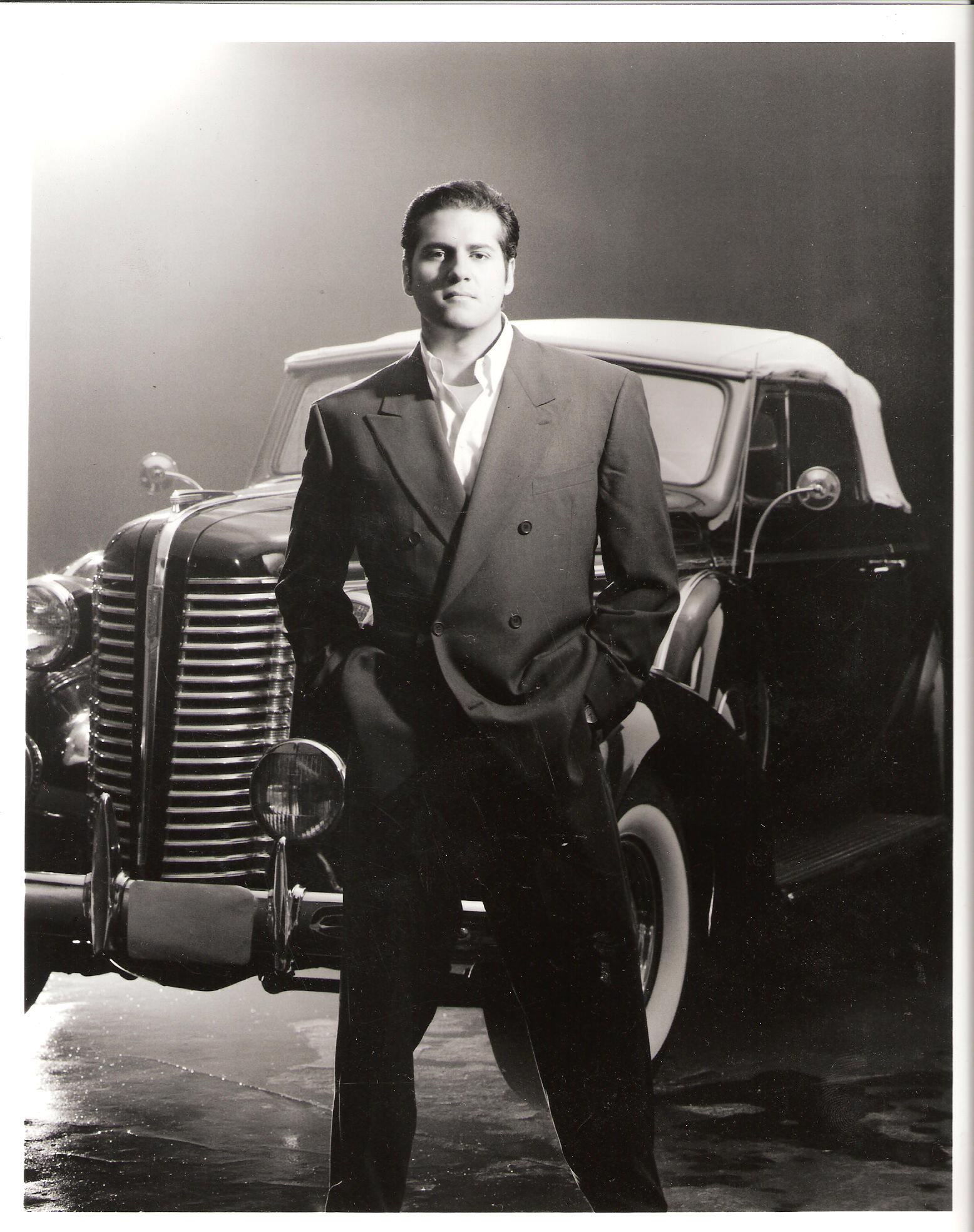

Still, “Mysteries and Scandals” was my break. The show was exactly what the title suggests. It was a gossipy retelling of lurid and suspicious stories involving celebrities.� (Above centre, click to enlarge promotional shot, of AJ, for "Mysteries and Scandals.")
Michael Danahy had the show idea, and pushed me as host. He wanted to stress the New York fish-out-of-water in Los Angeles angle. I loved the idea.
I flew to LA, on my own dime. We shot a ten-minute pilot, with no budget. “E!” bought thirteen episodes.
Thirteen was a good number for “Mysteries and Scandals.” The first buy was thirteen episodes. Our offices were on the thirteenth floor. We had thirteen employees.
GS That’s funny.
AJ I’m thinking there is no way “Mysteries and Scandals” is going to succeed. My producer was a 55-year old gay man, from Nebraska. I'm his star, the host, this tough man from New York. How could this work?
“Mysteries and Scandals” ran from 1998 to 2002. We shot 176 episodes. The content, stories about Hollywood murders and debauchery, which everyone wants to know about, made it work. We told true stories about long-dead stars, such as Marilyn Monroe and Carole Lombard. I don’t think one episode had a happy-Hollywood ending.
This was a content driven show, which says a lot about what viewers want. To this day, people stop me to say how much they enjoyed one episode or another. The lives and lifestyles, of Monroe, Clark Gable and Greta Garbo, don’t go out of style. “Mysteries and Scandals” is an evergreen show.
Fifty years, from now, stations will run “Mysteries and Scandals.” There’s the appeal of Hollywood, of course. More important, the stories and how the stories unfold, touch feelings, which exist everywhere and always.
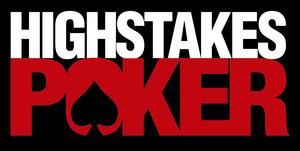


GS You co-host “High Stakes Poker,” now, are you a poker player?
AJ I know nothing about poker. I thought holding four fours was four of a kind. Gabe Kaplan, the other co-host and poker champion, corrected me, on air. “It’s called a quad,” he says.
GS You’re getting much better. On the last show, of season four, you called a pair of deuces, ducks. You learn well.
AJ So funny, and here’s what happened, with “High Stakes Poker.” The Game Show Network (GSN) was looking for an AJ Benza type to co-host a poker show. This is what GSN put out, an AJ Benza type.
GS I don’t know how unusual such a casting-call is for television, but it’s common in radio. A station in a major market once advertised for a Dick Summer style dj, when Dick was out of work.
AJ Here’s a reason GSN wanted someone like me. Gabe Kaplan, the other co-host, is a stand-up comedian. He starred in a 1970s sitcom, “Welcome Back, Kotter,” on ABC. Kaplan portrayed Gabe Kotter, a teacher who taught at his old high school, in Brooklyn. The central characters were punks, who stayed in school. John Travolta portrayed one of the punks. My public image fit right into the “Welcome Back, Kotter” style.
GS “Kotter” reruns across the world, in many languages, and poker is popular everywhere.
AJ Right, so I say to my manager, "If we can get this job, I'll quit LA and move back to New York, where GSN is based. I'll be a bouncer, to make ends meet. I'll do anything.”
My manager contacts GSN. I meet them, in New York. They ask, "You know poker, right?" I say, “Yes. I love poker.”
I never played poker in my life. I didn’t think before answering, which was good. Here I was, at GSN, surrounded by the top poker minds, in the world. Whom am I going to fool?
The people running the show are poker experts, the best players in the world. Yet, they hire me. The first year or two, on “High Stakes Poker, were gut-wrenching.
I tried to learn poker, without much success. What’s my role, if I don’t know the game? I became the typical viewer, at home watching poker. I’m a viewer, who doesn't know much about what he or she is seeing, but enjoys the show and wants to learn.
As time went by, people started stopping me on the street or writing the show, saying, “Keep asking those questions. I don’t know the answers, either. Don’t be embarrassed. We want answers.”
GS You’re a Greek Chorus, of sorts, on “High Stakes Poker,” suggesting what’s important, I guess. How do you like that role?
AJ I love my role on “High Stakes Poker.” The dramatic highs and lows are a roller coaster. If you’re not an expert, you can lose track. The jargon can intimidate, too; who knows from quads, ducks and so forth.
I like being the regular Joe. I get to ask the expert, Kaplan, and the pressure is off me, on to him. I’m open and honest that I don't have a clue about what they’re saying. When I get something right, such as two twos are “ducks,” everyone, even Kaplan, is ecstatic.
GS Wasn’t “High Stakes Poker” cancelled by GSN.
AJ The show was on break for a year or so. It was torture not doing it. Finally, GSN appointed a new Vice-president for Programming, Kelly Goode. Her first decision was pure wisdom; she put “High Stakes Poker” back into production. “It’s our number one show,” she said.
A few weeks ago, “High Stakes Poker” had its highest ratings ever and remains the highest rated show, on GSN. This is like the heroin of poker players and fans. Viewers upload poker hands, from the show, to YouTube. Each hand receives a million or more views. People are fanatical about “High Stakes Poker.”
GS How’s working with Gabe Kaplan?
AJ At first, working with Kaplan was rough and tough. He’s among the top poker players, and won a few championships. I know nothing about poker and he surely wondered what was up.
After a short while, we realized we’re both from Brooklyn. We remember the raised trains and 18th Avenue. Most of all, we share the Brooklyn spirit.
I'm thankful to have a job, in this town, these days, working alongside good, able people. Gawd knows some terrible shows pay a wad of money. It's tough to decline the reality shows. I’m thankful “High Stakes Poker” is on, and successful.
An agent, says Howard Lapides, referred Benza to us. Andrew Lear and I now manage Benza. I thought we were doing the agent a courtesy, but it was love at first sight. After talking, with AJ, for five minutes, he sold me. AJ is an all-around talent – journalist, actor, writer, host: he does it all, well.
The first show we worked, with AJ, was "Cold Turkey." AJ was doing spots, on the Joan Rivers Show. He was so well received, the producer, Stuart Krasnow, wanted to find something for him. “Cold Turkey” was a tough-love show focused on helping smokers, stop.
GS Kato Kaelin said you walked from a reality show, on Fox. That impressed him. He said it cost you a bundle of money.
AJ I dabbled in reality, but it wasn’t for me. “Gimme My Reality Show,” on Fox Reality, involved seven celebrities competing for their own show. After a week, of shooting, I left the show.�
At first, I didn't like the cameras in my home. Then I didn't want the cameras in my home. I didn’t my children wearing sound packs; they need a childhood.
At first, I bought the idea viewers would see a different side of me. Only in Hollywood do you get a second or third chance to make a first impression. I thought “Gimme My Reality Show” might find a new or renewed audience for my work.
Maybe, too, I thought, it might lead to bigger or better offers. I know minor talents, who, after a week or two on “Dancing with the Stars,” get large offers. This is part of the Hollywood temptation package.
Reality shows wreck careers, I think. In the 1970s, “Love Boat” and “Fantasy Island” gave exposure to actors on the way up or down. Today, this is what reality shows do and I don’t want to risk my career.
The temptation is great, but the negative effect might be too much. Maybe I take a couple of big offers, coming from a reality show. I work a few episodes before the network cancels the shows. I travel the talk and gossip circuit a couple of times. In six months, I’m filling out an application at Starbucks.
Yet, if reality shows stay and the right one comes along, I’ll do it. What’s the right reality show for me? I have no idea, other than it must make my kids laugh.
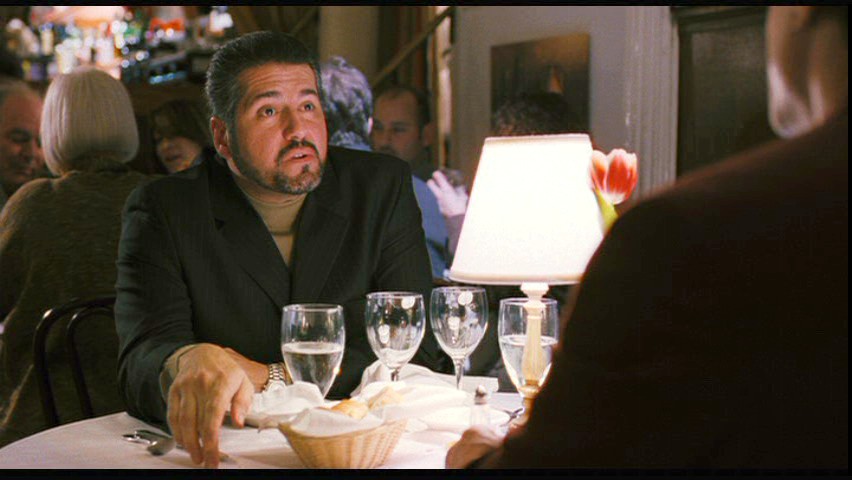
GS You had roles in ten movies, I think.
AJ Yes, ten movies. The first was “Ransom,” in 1996. Ron Howard and Brian Glazer wanted to get me into the movie. I played a reporter and got a taste of acting.
I'm most proud of “Rocky Balboa" (above). I portrayed LC, the manager. That was a dream come true, to do a Rocky movie. Working with Stallone was the best for me.
In, "P. S. Your Cat is Dead," I loved playing Carmine, the big, crazy gay role. I pierced my nipple for the role. I worked out twice a day. That movie was fun.
GS Is acting your new passion.
AJ I’m not sure. Acting is something I wanted to do since I was a kid; it was on my list, number seven, I think. Now, in my forties, with ten movie roles, I know there’s not much chance I’ll make the A-list, but movies are fun. Guess I’m learning that having fun, while you pay the bills, is a solid achievement, in any line of work.
Show business honesty is important. Too many struggling actors, writers or singers avoid honesty. I alluded to it earlier and I think I’m honest about Hollywood.
GS How do you define honesty?
AJ Honesty is accepting luck. Miramax might have produced a television show, with Jeremy Piven, based on my book, “Fame.” I would be famous, maybe rich and set for life. Miramax chose not to move on that project.
What do I do? I trudge forward. I keep trying.
While I’m trying, I luck-out and find a middle ground to pay the bills. My middle ground is “High Stakes Poker.” For Kato Kaelin, it’s “Kato’s Korner”; a show he does for National Lampoon. Kato is also doing a stage show in Las Vegas.
When show business is your job, not only an illusion, success is easier to find. When show business is not only a dream, a wish for fame, recognition or adoration, your chances of making a living, supporting your family and working at what you love, increase. As in any job, an honest attitude most often leads to success.
GS Can you give me another example.
AJ Sure, I think Patrick Dempsey, of “Grey’s Anatomy,” is an example of what I mean. Dempsey is a “Hollywood” friend. I know the names of his kids and he knows mine. We may work out, at the gym, alongside each other. We say than “Hi,” but not much more.
I told him about a pilot I did for Fox, with Simon Fuller, of “American Idol.” Everyone figured Fox would buy the show, but didn’t. How could Fox turn down its “cash cow,” Simon Fuller?
Dempsey says he did seven pilots before “Grey’s Anatomy.” Not one aired. Hollywood is a strange town, but if you’re honest, there’s a way to succeed.
GS What’s your passion, if not acting?
AJ Writing is my passion. I don’t have much writing work, now, but it’s what I love to do most. Newspapers are dead. Magazines are having a rough time. The web is growing, but there’s not much revenue, yet. Still, writing for me would be my biggest high.
I'm not going to lie. I love acting, too. I’d love to be in a movie soon, and that will happen.
GS How can you be so sure more acting offers will come?
AJ Being honest, with me, I hope for the big roles, but take what I do well. What I do well, for now, are “half roles,” third banana roles, which are great. You don’t carry the movie, when you play a half role, so no chance of embarrassing yourself, if the movie flops. You can live well on half roles.
GS Frank McHugh, who specialized in half roles, as sidekick to the male lead, for example, worked constantly from 1930 to 1970. The half role route is honest and worthy.
AJ Yes; and there are roles in small movies, too. “Juno” and “August Sunshine,” both small movies, were big hits. “The Wrestler” fits in that category, as well. A role, in a small movie, lets you act and, if it hits, you’re a star, without the pressure of having to carry a movie everyone expects to be a hit.
I like how we, my family, are living now. I want my kids to enjoy this success, what it offers, such as having time to spend together. We don’t need a million-dollar mansion, on the hill.
I see my family every day. We go to the zoo, the park, Disneyland or Las Vegas. We’re a family. Many people, who are too busy filming or performing, would kill for what I have and won’t give up. I'm lucky.
GS Back to honesty.
AJ Yes, and often, when you make piles of money in this town, you have to sell your soul. Writing and half roles keep me from that horror. I get the best of all worlds; work at what I love, have a full family life and make the most, the best, memories.

GS I noticed you dabbled in new media, with the “Real Guys Movie Review,” on YouTube.
AJ Right, with Neal Gumpel, a friend I met in Los Angeles. We shared the same manager. We started writing movies together, and it wasn’t long before we were finishing each other's sentences. We’re working on a film, now.
GS Neal is hilarious, in flat way, and seems a great partner for you, in the Ed McMahon style.
AJ Yeah, I’m talking, all the time, waving my arms. Neal sits still, his hands resting on the table in front of him and utters the funniest lines on the show. Neal is hardly on camera, but makes the most of what he gets.
GS What’s the idea behind “Real Guys Movie Review”?
AJ We want a down-to-earth show. We don’t talk about camera angles or anything artsy. We stuck to what we like or don’t like about the movie.
In our review, of “I am Legend,” Neal wonders why the Will Smith character eats spam, a point no other reviewer caught. “Every top restaurant, in Manhattan,” Gumpel says, “is empty, with gourmet food for the taking. Why eat stale-dated spam?” Neal was a chef in New York City, for a while. I thought the movie was all right, but mostly it was a big cheque for Will Smith.
GS Your approach on “Real Guys .…” is refreshing.
AJ Mainstream review shows treat movies as sacred, and that’s a valid view. People go to graduate school to learn how to review movies, and that, too, is all right. Most people go to movies, rent a DVD or watch pay-per-view and aren’t concerned with camera angles.
Neal and I wanted to target the typical movie fan, not the expert. We thought “Juno” was terrible for the creepy, child abuse undertones, but the acting was great. Award shows and most reviewers disagreed about the themes, but not the acting.
My favourite, of our reviews, was "Sex and Death 101." You'd think, with a title, such as that, it's a Wood Allen movie, but no. Neal, I think, preferred "Nim's Island."
GS You and Neal offer a different view. That’s good.
AJ Good in theory, but “Real Guys Movie Review” was a web show. We filmed all the reviews in one, long day. Someone uploaded the show, to YouTube, but didn't tell anyone. The show languishes. The backers expected a million page views, the first day, without any promotion.
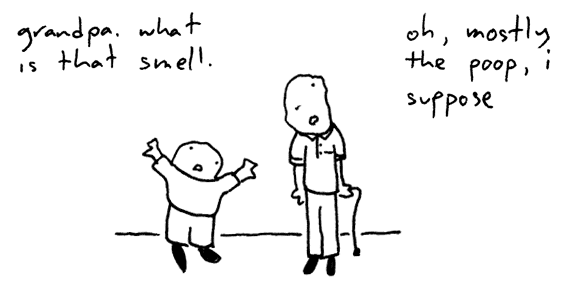

GS Right, there are at least four billion web pages available, but who knows about more than a few. What’s your take on the web, as it now exists? At the bottom, of the interview, there are links to two of your best reviews.
AJ The web, for all its potential, is yet to realize much, especially as a positive force. Maybe it’s growing pains. I’m not sure.
Years ago, when google first appeared, I searched my own name, a lot. If someone said something good about me, I sent her or him a bottle of scotch. Mostly, the searches uncovered nasty untruths about me.
Some people think they know celebrities. They watch a celebrity on television and start to think they know the person as they know their friends. They don’t know the celebrity, one bit; what they know is a well-managed, invented image of the celebrity.
Based on the image, they say the celebrity is this way or that. Many people wrote I was gay because I was a gossip columnist. Others said I had children that I didn’t support or I dated some starlet I didn’t know. All lies, from people who don’t know me, never knew me and likely won’t know me.
I got past the lies, a long-time ago. The lies hurt my family, though, especially my children. It’s easy to explain what the gossip media reports, but near impossible to explain what another person says.
Bloggers are people, not the media. On some level, we think a blogger is the person behind us in the line at Starbucks. Face-to-face, we believe questionable comments.
GS Sure, intelligent women and men believe the most egregious urban legends and myths because a friend told them.
AJ Right, bloggers are strangers. We seldom ask, who are the bloggers and how do they know. Mostly, I think, bloggers are the women and men who think watching a celebrity, on television, every week, is the same as knowing them face-to-face.
GS This seems dangerous, at least to reputations.
AJ Facebook and MySpace make the blogging sphere worse. Facebook is great for connecting to friends I haven’t seen in 25 years, a high school sweetheart, maybe. Yet, I don't feel any need to tell people know what I'm doing every minute or what they're doing every minute.
2:46 am AJ is musing at his keyboard.
2:49 am AJ is going to the john.
2:57 am AJ is musing, again.
Give me a break. Yet, there are Facebook users who do this exact tracking 18 hours a day. This can’t be good for anyone.
Track the details, of your daily life, long enough and anyone who reads it starts to think she or he knows you better than he does or she does. This is scary and maybe weird.
When one of these Facebook friends lies, such as AJ has a love child with Martha Stewart, it carries the weight of a face-to-face friend saying it. A least with the face-to-face friend you have a known quantity and some history. Who knows anything, for sure, about a Facebook friend?
It’s time to start asking, before you believe, who knows what. How anyone comes to have an opinion? Do they know from experience or study? Are they assuming or speculating? Are they lying to get attention?
I'm not blogging, for now, anyway. I’d rather not travel with those who offer baseless opinions, anonymously. In time, I’ll likely have to blog, in some form, since newspapers are failing and magazines are cutting back.

GS Someone, your former agent, maybe, said you’re too New York and not enough LA. How do you respond to that assessment? (Above: New York, left; LA, right.)
AJ Well, I’m from New York. I think anybody who's too Los Angeles is out of line. I'd rather be too New York than too Virginia or too Wisconsin. Who doesn’t love their home town?
In LA, who cares about you? In New York City, people care about one another. I'm not going to change; I can't change my childhood experiences.
GS Has your New York side soften in the time you’ve lived in LA.
AJ Yes, I think so, more than I like to admit. I’m not as much New York as I used to be. My temper is tamer, not that it was ever as wild as the bloggers would have you believe. I am more patient, now, too.
Maybe it’s ageing. Maybe it’s having a family. Maybe it’s LA.
Still, there’s an air, when I walk into a room, which says New York, in a good way. I'm proud of it. If that means my career suffers, that, too is all right.
GS What do you think of the two cities, New York and LA?
AJ There’s no comparing Los Angeles to the New York, where I was grew up and worked.
I love LA, and always have. At first, Los Angeles was a great place to visit, if I could go home to New York. I never thought about living here, though.
LA was fun. It was cool to visit, go to the clubs, meet women, go to Playboy Mansion. I thought it was paradise.
I thought it’d be good to have some celebrity, say, with a TV show, and hang around LA. I was on cable television, for a while. The show originated in Los Angeles. I had fun coming from New York to do the show. I imagined I’d be a movie star in this town, but going back home, in those days, was best.
In New York City, I was a star. I wrote top columns, “Hot Copy” and “Downtown, for the “Daily News.” In my mind, I was more important than was the mayor. Maybe I was, given who was mayor at the time.
Yet, there’s no comparing the two cities, LA and New York. The cities are different, yes, but comparable, no. New York is my wife. LA is my stripper girlfriend.
GS That’s an interesting analogy.
AJ Now, that I’m married and have a family, I realize LA changed my life, changed my career path and all for the good. I had a New York state of mind, but now I love LA. I wouldn’t trade the changes, for anything. I never think about moving back to New York City, any more.
Today, I’m a tourist in New York. My home is LA, Burbank, the valley. What would I do in New York? There was time when I knew my way around New York and I owned the city. I met my family in New York. I made my family in LA.
GS You talk so much and so lovingly about your family, but you have a bad boy reputation, what got you to settle down.
AJ I was a jerk. I fooled around with everyone, in LA and New York. I had a great time. I burned the candle at both ends and in the middle.
Once I settled into LA, I realized, in some ways, it’s more dangerous than New York City. There's a subversive late-night subculture, in Los Angeles. Most people, even long-time residents, don’t see it, but it exists.
The late-night clubs and house parties are enticing, in New York City and LA. The temptations are much worse, in LA, much more lethal. I wrapped into that lifestyle, for a while.
GS How did you find your way into that nightlife, the underbelly of LA?
AJ One night, I was drinking at Dan Tana’s, a major hang out, on Santa Monica Boulevard, in West Hollywood. I noticed a Black man, standing at the bar, waiting for a drink. When he finally gets a drink, some White drunk, standing next to him, says to no one in particular, “You serve that nigger before me?”
At that, I let everyone know how much the comment offended me. That’s LA, though; you only hear that comment in some parts of New York City, but everywhere in LA. Anyway, the drunk wobbles out on to Santa Monica Boulevard and disappears into the night.
GS You enjoy exposing the raw nerves of evil.
AJ Ha – the Black guy is watching intensely. He says something along lines of “Holy Cow,” but more colourfully. We’re friends to this day. He says my date and I should come to his home, in South Central, Los Angeles. When we get to his house, it’s crowded, with hookers, drug dealers and providers of whatever you wish. There were pimps, with electric ties, and ice cubes that glowed in the dark.
In South Central, I learned about life, from men named “Big Sleep,” “Coffee Red,” “Mouse” and “Slick Rick.” There was a time when I was comfortable among these men and women. They seem most honest about whom they are and what they do.
This was my introduction to a major part of the late-night lifestyle in LA. In New York, there’s an implicit curfew, you knew when it was time to go home. There’s no such notion in LA, where it never ends. Both New York City and Los Angeles have a seedy side, but LA is most dangerous, I think.
GS What’s the other part of this lifestyle?
AJ In LA, many kids, children and young adults have enormous wealth and fame. Gangs of hangers-on depend on these stars for survival. Tom Cruise might have fifty people on staff, for example.
I’m not talking about Cruise, though. I’m talking about the new stars, mostly, but the older stars, with no grounding. The older stars might be on their way down or out of show business.
It’s good for the hangers-on to keep their celebrities happy and distracted. Whatever a star wants to do or try is available. These wealthy, famous women and men are often out of control, egged on by their entourage. They know few limits. Their wants quickly morph into a complicated, strange and sometimes dangerous lifestyle.
You find the same forces in New York City, where the underbelly of is less intense. In a sense, New York City has rules that LA doesn’t. LA is placid Lotus-Land by day and lurid “Deadwood” by night.
GS Why do you think LA has a split personality?
AJ Los Angeles, is warm, all year, sprawling and everyone believes it teems with opportunity. The delusions and illusions, of the city, are on the screen and in the streets. LA attracts many types of people and some may see the lifestyle as a route to opportunity or success.
New York has harsh seasons, cold winters and humid summers, which reflect its attitude, welcoming but a difficult place to flourish. New York City is clear, on the best make it here. Others must leave quickly or remain quiet.
Many of the famous and wealthy, in LA, have too much time on their hands. What’s the saying, idle hands do the devil’s work? Too many women and men, in LA, use drugs to flee the boredom.
Mostly, I think, they want to avoid loneliness. Drugs are a side bar. They want and need someone to talk with, who doesn’t say buy me, bring me and so forth; they want a friend.
In this sense, New York City is much friendlier. New Yorkers identify a difference between work and play. There are those you work with, in New York City. There are those with whom you play.
GS In LA, then, these women and men are escaping the boredom in a dangerous underworld that offers endless stimulation and fresh experiences.
AJ Yes, and outside Hollywood, few believe this world exists because they haven’t seen it for themselves.
These stars work three months to earn millions of dollars, but they might not work again for a year or two. Hollywood is hard work and most stars, one way or another, embrace a strong work ethic – get up in the morning, work until midnight and so forth. When they earn so much money and work so little, pangs of guilty may arise.
It’s hard to believe. Still, a strong work ethic, not aligned to the way Hollywood works, makes some men and women, celebrities, mostly, feel guilty. The down time and boredom add to the problem. Nothing, in this city, is simple or easy, but every distraction is readily available.
There are too many lonely and miserable women and men in LA. They have money and time on their hands. Drugs and other unusual pleasure are too available. The temptation, of a promise to ease the pain, is hard to ignore, especially when their entourage is telling them to go for it.
Crashing and burning is a major LA pastime. Rehab is a prime industry in this city. It’s not only Brittany and Lindsay, but also anyone, who isn’t careful or honest.
GS Is there another group pushing the underbelly lifestyle forward.
AJ Yes, in a ways, I guess. Years ago, I’d pull up to a club. If I got in, one or three of these women, who were everywhere, would ask to go along, with me. “They won’t let me inside unless you take me; please, AJ,” they’d coo. Who could say no?
GS These women and men live in a seedy area of the mind, I guess.
AJ Today, I run into someone, from my early and wild LA days. Maybe, I haven’t seen him or her in ten years. They’ll say remember so-and-so, the psycho. She married a top honcho. They have three kids, a Hummer and a hybrid.
Then and now, she’s gorgeous and intriguing, but you wonder about her. They were all the same. It’s as if someone in the Mid-West has a production line, manufacturing these people, shipping most of the product to LA, but not too much to New York City.
I’m watching television, earlier today, and see a major actor married one of these women. Does he know what’s what? It is scary.
GS Are these the “4 am Girls,” you write about?
AJ No, well, may be, sometimes. At 4 am, the call comes mostly because she has no early morning meeting. She knows your fridge is empty; you didn’t change the sheets or shower before she arrived. She doesn’t care. The call is about sane, common lust. There are no politics, no campaigning or no long-term goals, only now. These women are not psychos. What lasts, though, are the nights you roll over, away from your wife, to stare at the clock and wonder if she, your 4 am phone call, is doing the same.
GS Often these are the deepest, most intensive relations.
AJ Yes, you both know she’ll never be your wife or even long-term girlfriend. She knows her role is different from a future wife or current girlfriend. The nights when she’d roll out of bed, fall into a cab and arrive at your door, a libertine, running for you, make many vivid memories. These are memories you can’t bust.
GS You outran her, though.
AJ Yes, in my case, unknowingly, I outran these women for Lola. (Below, Lola, with AJ and daughter, Roxy. Click centre photograph to enlarge.)
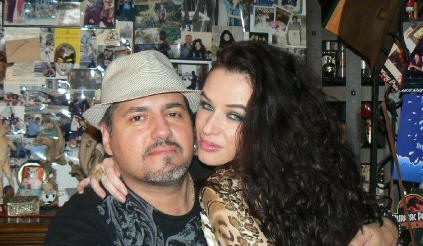
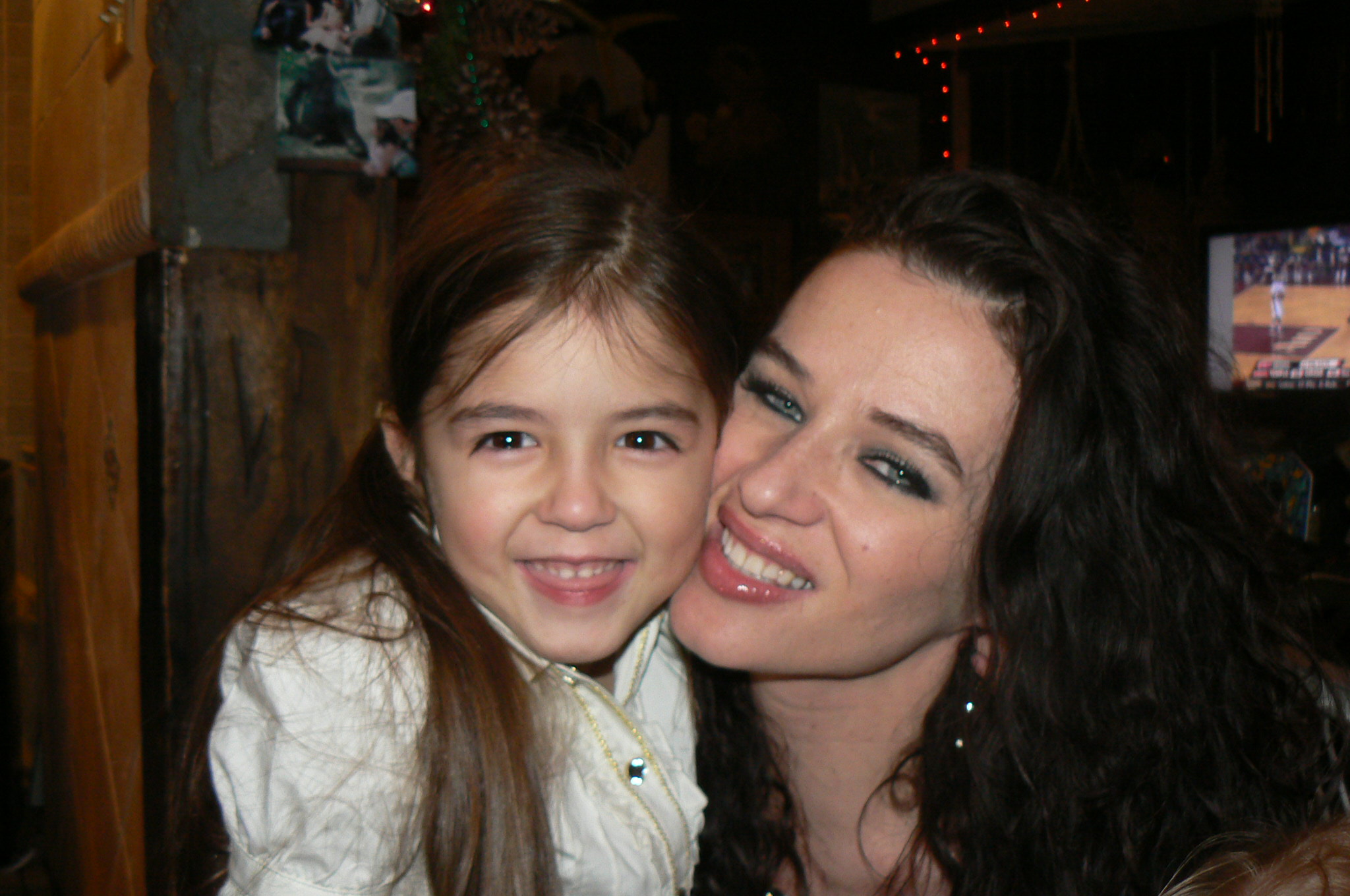
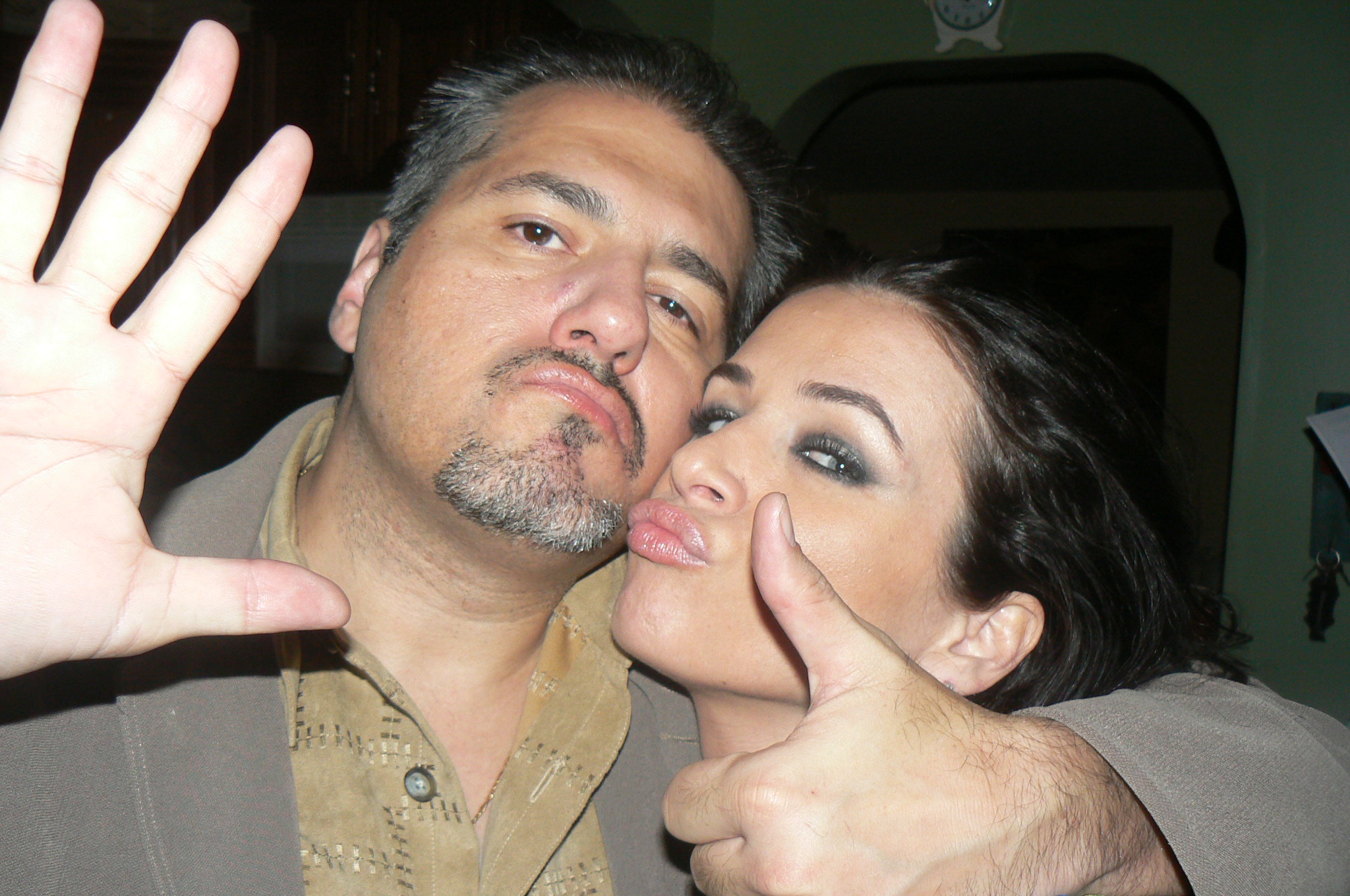
AJ and Lola; Roxy and AJ; AJ and Lola.
GS How did you meet Lola?
AJ One night, I went to “Deep,” the top nightclub in LA, at the time. It was at Hollywood and Vine, the most congested corner in the world. As soon as I’m inside, I see a beautiful woman, with the most beautiful blue eyes. I'm not a big "blue-eyes guy," but for some reason, it happened.
I say to a friend, “Who’s the girl?” He knows her and says, "That's Lola aka Virginia Folk. Do you want an introduction.” I say no, not now. I just want to look at her.
The way I figured it, if she looks at me, I'll talk to her, but I won’t start it up. I'm not going to do it, yet again. I’m not going to be a total jerk.
I know what you’re thinking. The moment I see her, I start to change. You’re right.
Turns out it’s a thirtieth birthday party for blue-eyes. I finally meet her. I say to her girlfriend, "You're going to be a bridesmaid, very soon."
I went home to my roommate and said, "I met my wife tonight." He said, "Who"? I said, "I don't know. I just met this girl. I know I'm going to marry her.”
GS Kato Kaelin says Lola, blue eyes, caused you to change, without trying, and in many ways, no one expected. She’s the best person to come into your adult life, he said.
AJ Kato knows, and he’s right. Lola and I started dating. She moved in, with me. It was a natural and easy, always seemed right.
I was dating someone else, at the time. I had to break up, with her, first. I asked Lola if she could wait for me. She did. I’m still ecstatic.
GS Lola brought someone to her relationship with you.
AJ Yes, Richie, or a certain baby picture of him. It's a big reason why I had absolutely no hesitations in marrying Lola.
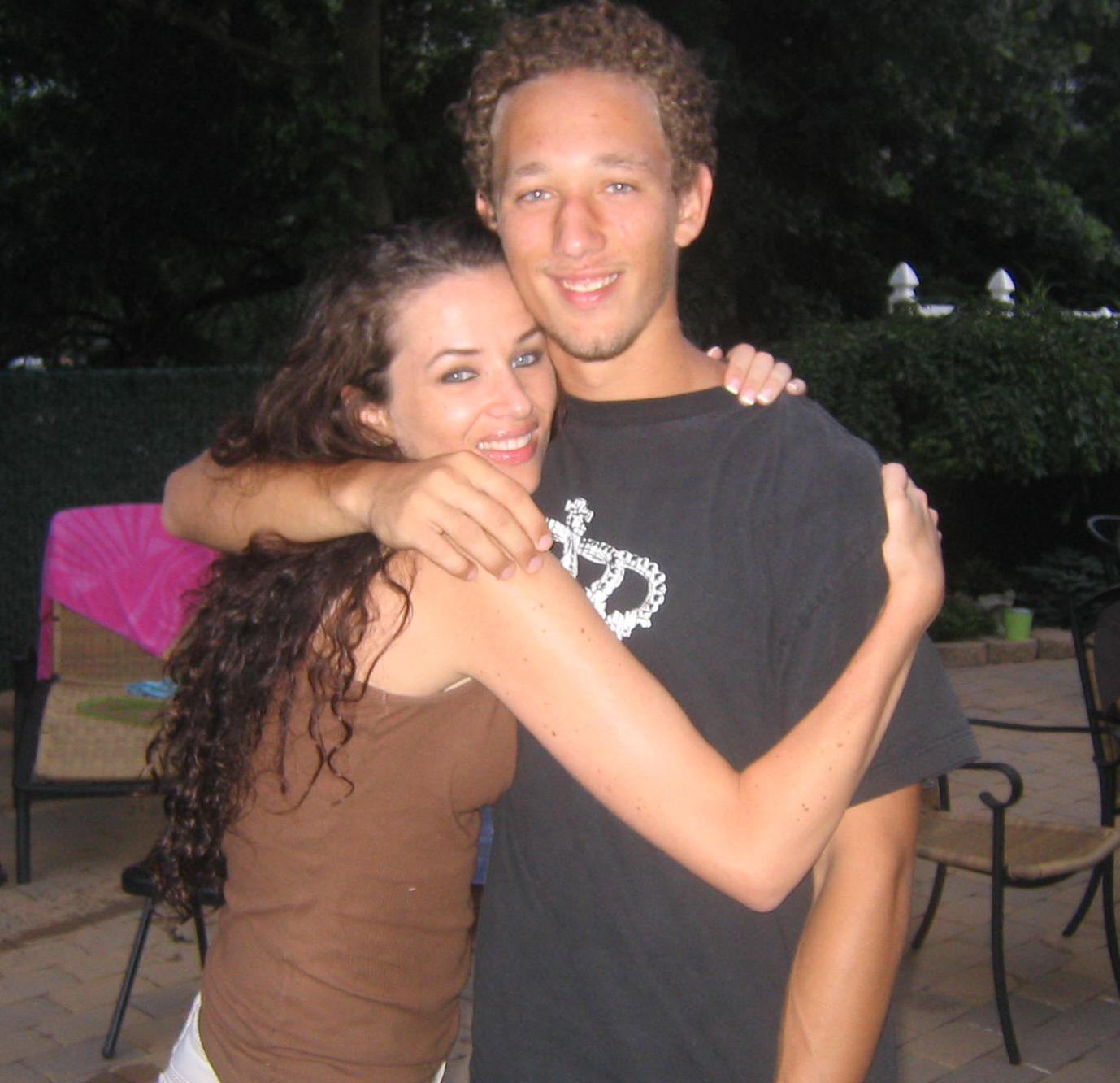
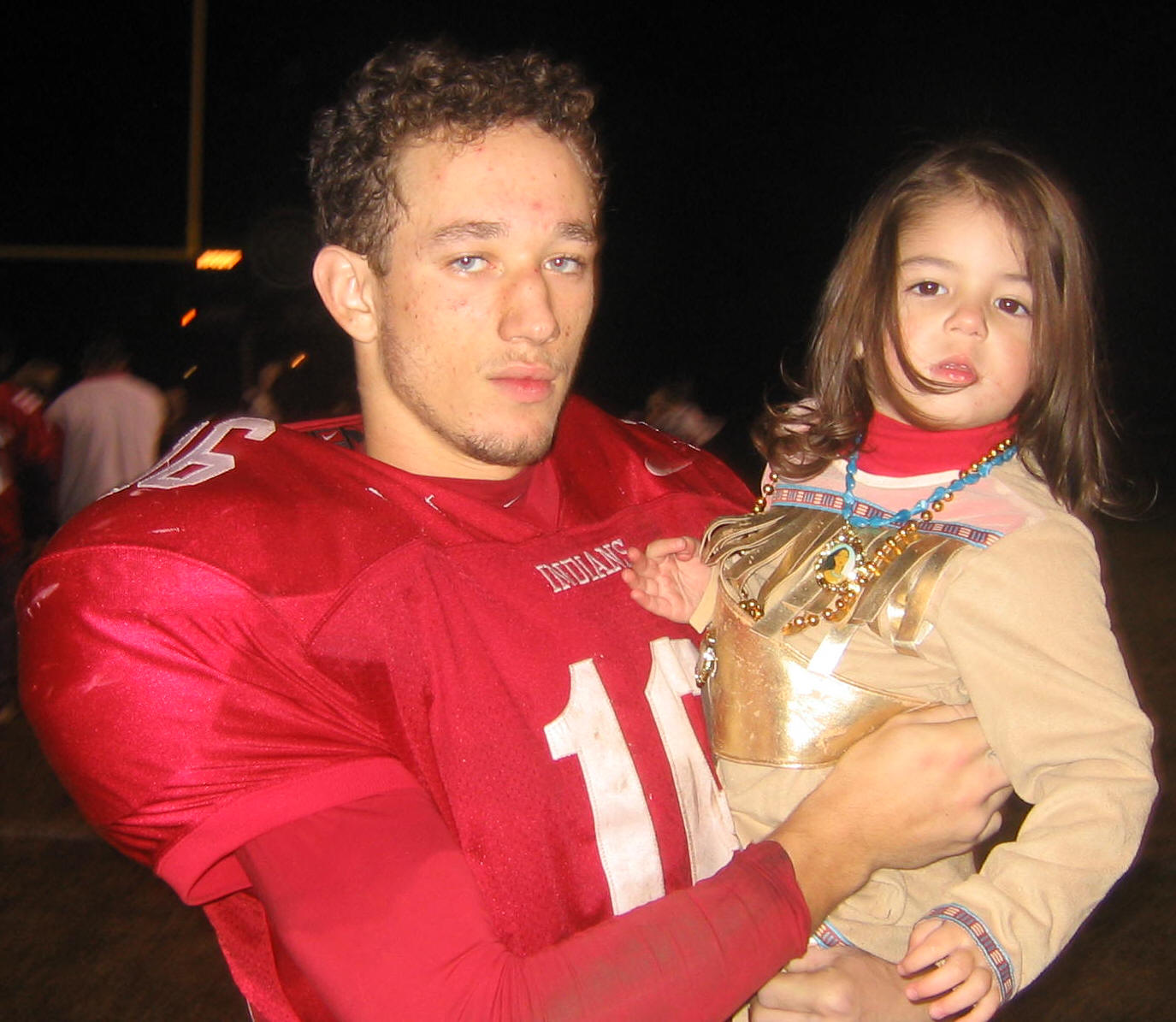
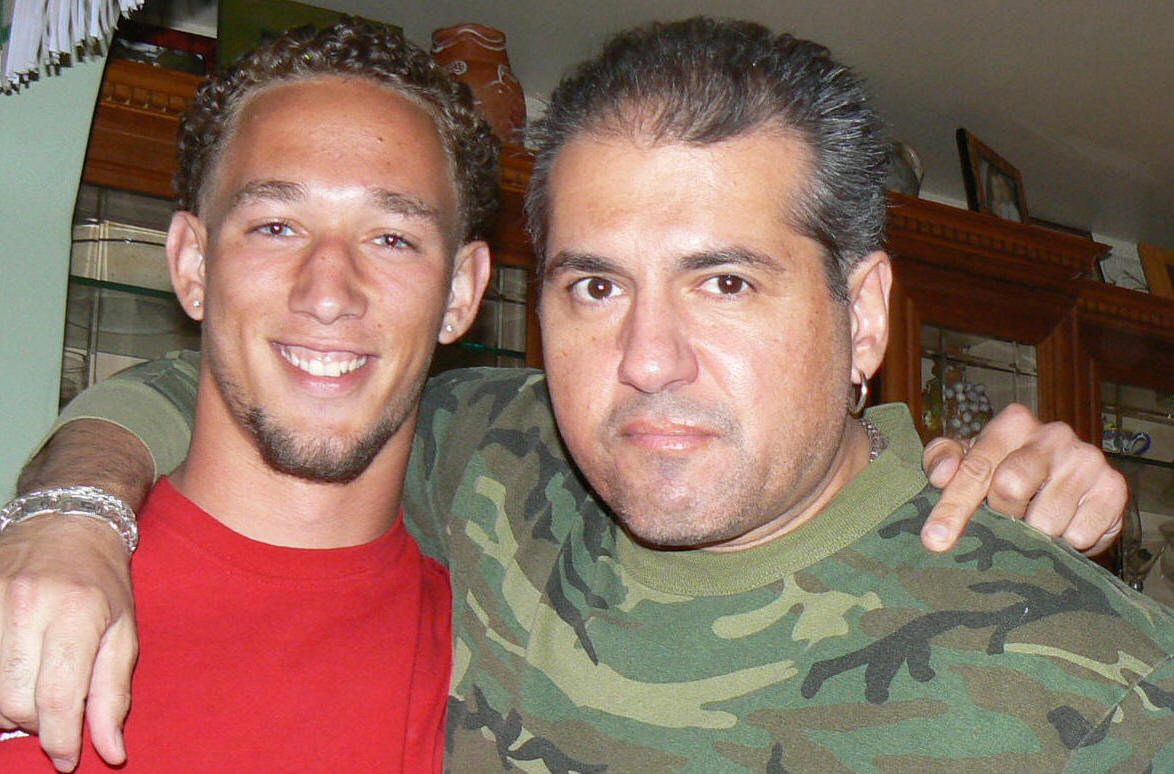
Lola and Ritchie; Ritchie and Roxy; Ritchie and AJ
When Lola and I met,�Richie was spending the summer, in Oregon, with his grandma. Lola and I had a few months, of no curfews and little responsibilities; it was great. I knew she had had a son, in her junior year of high school, with her first love. That she had a son, 12 years old, never bothered me. Why should it? (Left, Lola and Ritchie.
In the early fall, months after the summer ended, I met Richie. He was a typical 12-year-old boy. He had no father figure in his life, and hadn't for years, I knew I was going to accept that role, if he'd have me.
That fall was a
He said yes, without a blink. We had a cake, to celebrate. This became a big cake fight and the night ended with all of us laughing and very happy about the future.
In the six plus years I've know Richie, I can't tell you how proud I am watching him excel at football and track. Sports might never have entered his life, if had we not met at that impressionable age. He is a big, strong young man who goes to college, about 20 minutes away. He comes home every chance he gets, which is how I want it. (Left, Richie and AJ.)
Lola gave birth to Richie, in her Junior year. She returned to running track in her Senior year. She� became the Oregon State champion in the 400 Meters.
I saw a picture of her on the blocks, accepting her gold medal and atop her shoulders was baby Richie. I just couldn't imagine the dedication and the talent it had taken her to pull that off; raise a son at 16 and become state champion, at the same time. The picture makes me cry.
Recently, we went to Portland, where her high school inducted her in its Hall of Fame. I saw the video of her championship race. She was way behind the girl favoured to win. Then she just starts this kick out of nowhere. She wins going away. Her teammates surrounded her until she was invisible. I couldn't take it.
That had just confirmed what I already knew that wild summer we met. She was and is and incredible woman. I wouldn't have anyone else raise my children.>
GS What new challenges are on the horizon; what's next?
AJ In high school, my Social Studies teacher, Mr. Peacock, the one who go me to list my goals, always said, “Life is fast, and you’re not going to realize how fast it goes.” He was right. Time flies faster than you imagine. The list he made me write has been a big help; it guided my life, so far.
On the list, I wrote I wanted to be on television, write a memoir and work for a newspaper. I want to host a talk show; I was a big fan of Mike Douglas and Merv Griffin. I want to be in a movie and so forth. As I said, earlier, I’ve done all but two of the items on the list I wrote, when I was seventeen.
Nothing has made me a million dollars, but I can live comfortably and not to worry much. I'm blessed. I've done everything I wanted. If my life ended tomorrow, I’d have no complaints.
I hope for more movies. I hope to host more shows. I did these jobs and want to do more. It’s not greed, but fun. Still, I won’t do anything that might embarrass my family.
More writing is in my future. A book about the images of men and women, girls and boys, on television is rattling around in my mind. There’s so going on, so much to write about.
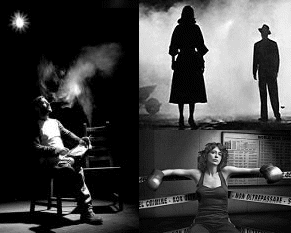
GS Have you thought about writing fiction, longer, maybe more serious work.
AJ Every writer thinks about fiction.
GS Your experiences, in New York City and Los Angeles, seem especially fertile for fiction noir.
AJ True, there are many stories in my experiences. I want to write more about the people and pieces, of my story. I want to write my New York stories and, now, my Los Angeles stories. There are many party stories and love interest stories, from both cities, to titillate readers. There are also a great many true, honest stories to warm your heart or make you angry.
A new book would be stories from my perspective. I believe people want to read these stories. Yet, this is harder than you might think. To write a book, find a publisher and so on.
GS Some writers use imagination, news reports or research. You lived much of what you could write. There’s a different texture to noir first-hand.
AJ “Mysteries and Scandals” worked that angel, of course. There was much more, to every story, than we could cram into 22 minutes on television. I think those stories might come from a different angle, too. As I mentioned earlier, I had stories in mind for a follow up book to “Fame,” stories from my perspective and new stories.
GS You described “Mysteries and Scandals” an evergreen show. Noir always seems vogue. You could launch from the show.
AJ I have to find a different voice. “Fame” has the voice of a young man, with too much attitude and early success, who partied too much. Maybe I was older, in those days, but I’m wiser now, to paraphrase Bob Dylan.
GS There’s a notable passage, in “Havana Heartbreak,” as it shows wisdom, found. Here’s what you wrote for “Playboy,”
It’s important to confess that most of my trips to Cuba [were] illegal … spur of the moment and spiritual. I remember white knuckling … through Newark International Airport to the confusing transfer, in Montego Bay or Cancun, and through the sterile, marble-floored Jose Marti Airport [, in Havana,]. I only mention this as evidence that Cuba’s magic is worth living through the drumbeat of danger and desire that played inside me … since my first visit.
The writing is pure skill. You show a cinematic sensibility, without much melodrama. It’s almost seven years, since you wrote that, what gives?
AJ Honestly, when I left New York, I lost my muses – Rocco, Johnny Boy, Chico and Frankie Giant. In LA, I didn’t have their eyes and ears. I lost interest in writing.
GS Maybe you needed some time to digest the distance.
AJ Maybe, but now, my family, Lola, Roxy and Rocco, are my muses. I’m feeling better about writing every day. The urge, to write, is back and I sense a new voice.
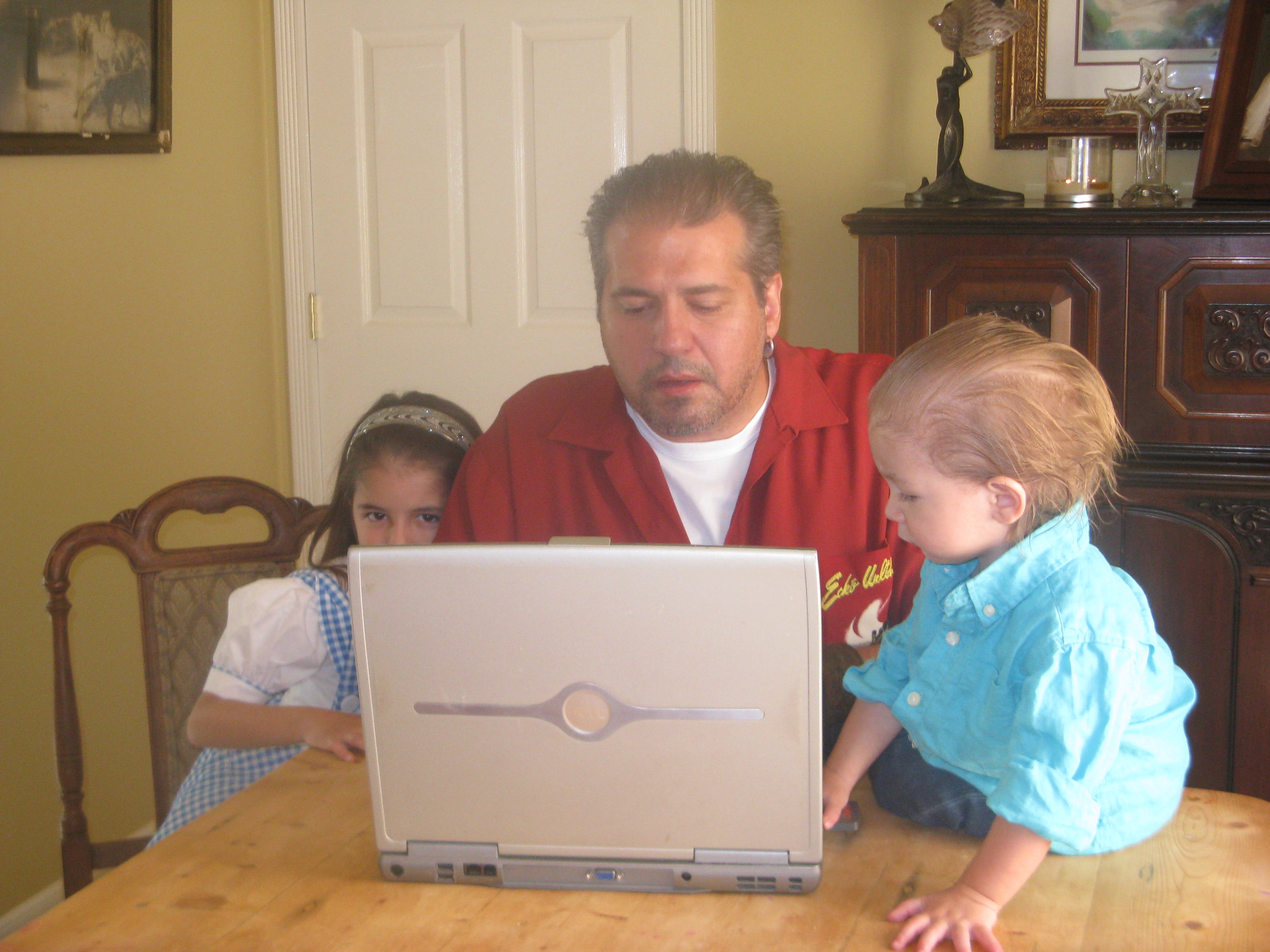
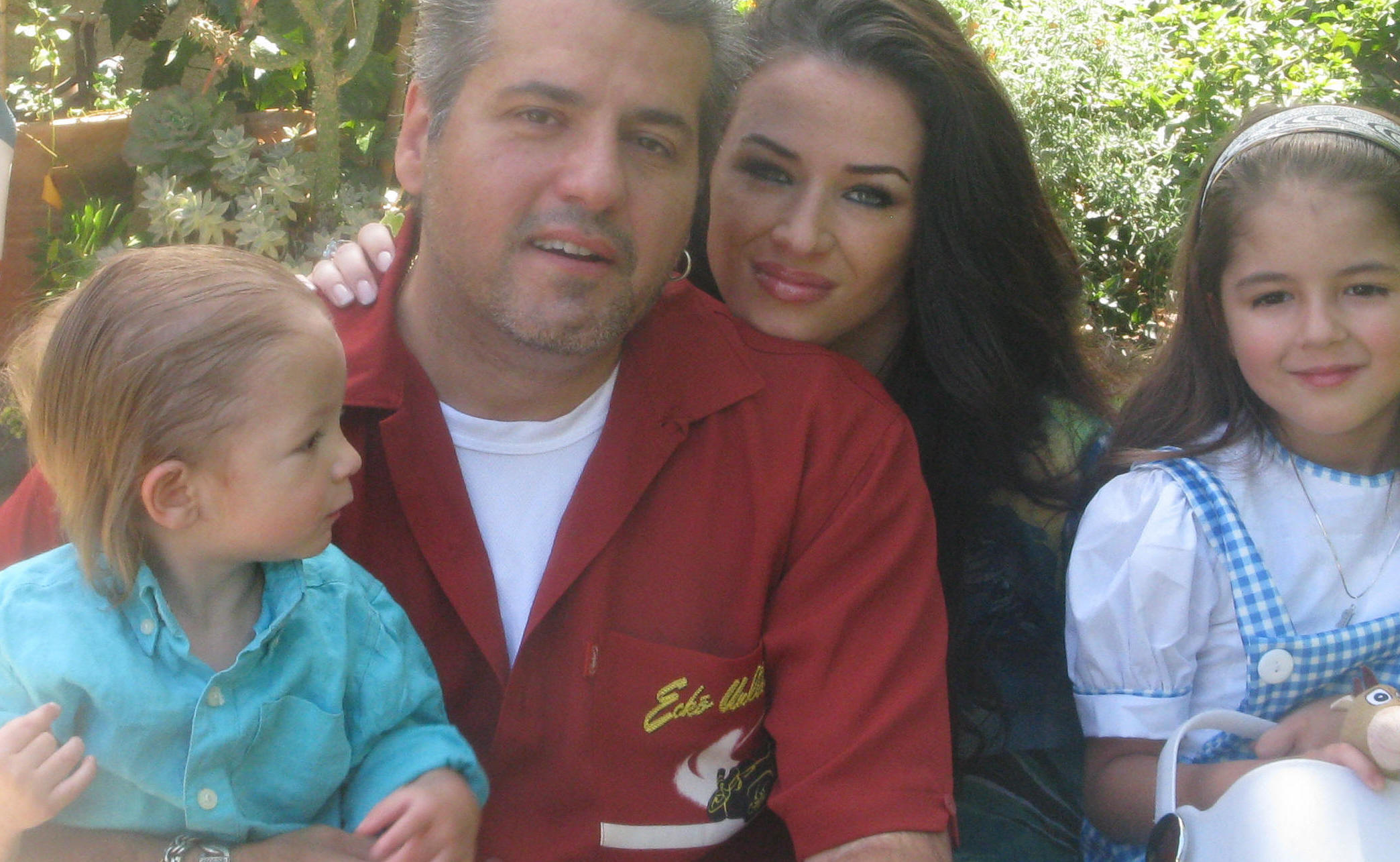
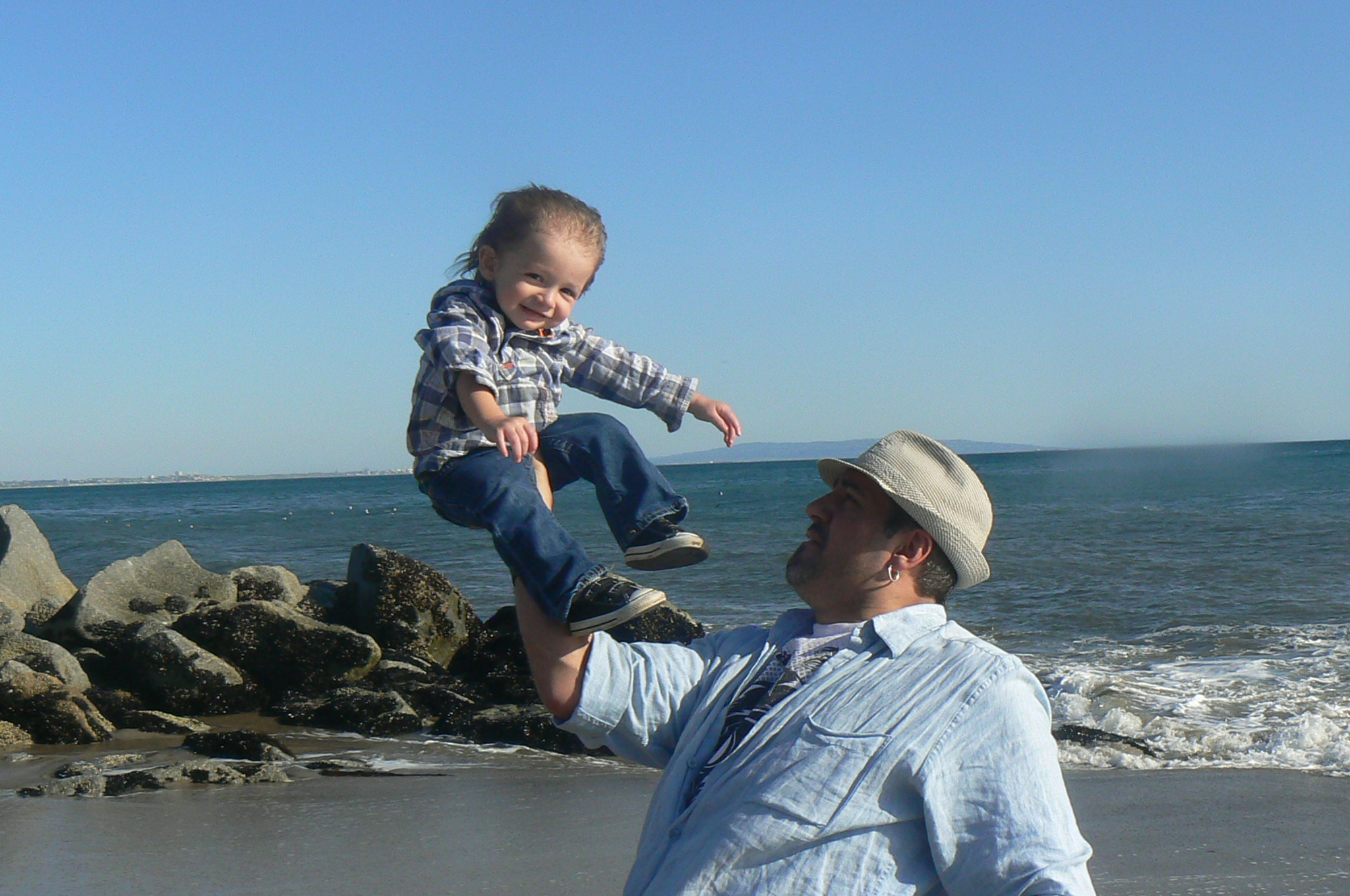
Roxy, AJ and Rocco; Rocco, AJ, Lola and Roxy; Rocco and AJ
GS What advice do you or will you, give your children?
AJ Mostly the advice my parents gave me: you can be whatever you want, don’t let anyone tell you different, be strong. Your parents always back you up.
A loving family is most important. My parents were always first to dance at wedding or party. It showed they were the happiest couple. Love always shows.
I’ll always tell my children to walk into room as if you’re first string, the showstopper and people are waiting for you. Give off the right impression. You only get one chance to make a first impression.
GS Except in Hollywood, as you mentioned.
AJ Of course, and most, of all, I want my children to make memories.
GS I want to ask you about the two items, on the Peacock bucket list, which you haven’t achieved, but that might jinx you. I’ll let it go, for now. Thanks, AJ.
Christine Grail, aka the Script Consultant, is a Los Angeles-based writer.
Click above to tell a friend about this article.
Recommended
- David Simmonds
- Dumber and Dumber
- Pandemic Hairdos
- The Mabel Smith Story

- Sjef Frenken
- Sex (gotcha!)
- Espirit de Core
- The Very Bottom

- Jennifer Flaten
- Kid Sickness
- Food for Thought
- Zombies and Snoopy

- M Alan Roberts
- Culture Salad
- Tiny Teachers
- Paint My Face Red

Recommended
- Matt Seinberg
- A Trick of Time
- The Economy Sucks
- Tri-annual Radio Party 2017

- Streeter Click
- Content Submission
- WBZ AM 22 May 74
- Grub Street Philosophy: 3

- JR Hafer
- Why and Wherefore
- Fantasy of Flight
- Piet Soer

Recommended
- AJ Robinson
- Strange Weather Indeed
- Making Candels
- Elderly Workers

- Jane Doe
- Char-broil 480
- Can Trump Win
- The Jazz Age

- M Adam Roberts
- Essence of a New Day
- Learning to Fly
- The Secret

- Ricardo Teixeira
- Harmony
- The Future
- Monkey Business



